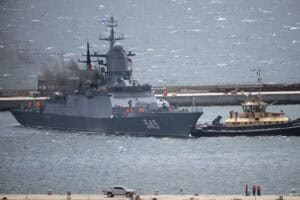Ramaphosa was responding to calls for the withdrawal of the troops for safety reasons.

President Cyril Ramaphosa has assured South Africans that the South African Defence Force (SANDF) troops are fully equipped to handle conflicts in the DR Congo.
Ramaphosa deployed at least 2 900 SANDF soldiers earlier this month to provide support in combating illicit armed factions in eastern DRC.
He said the deployment was to fulfil the country’s obligation towards the Southern African Development Community (SADC) mission to the DRC.
On Wednesday, two soldiers lost their lives in the region, while three more sustained severe injuries after a mortar bomb landed inside one of the South African Contingent’s military bases.
The deployment has been criticised by experts and political parties, who have called for the SANDF’s withdrawal from the area.
Economic Freedom Fighters (EFF) leader Julius Malema said on Thursday: “They are not properly trained. They must come back home and we must stop with any military deployment until we are fit and proper. Cyril Ramaphosa wants to kill our children in DRC.
“Those [M23] rebels are well equipped. Look at what they did, they hit our base. Who goes to a base of an army if you know that thing is an army and is powerful. You go to their base once you have undermined them.”
Last month, the Democratic Alliance (DA) called on Ramaphosa to recall the troops, arguing that the deployment would place the lives of SANDF members at risk.
“The reality is that the SANDF does not have the capacity to effectively pursue an anti-insurgency campaign against the M23 rebels and neither does it have the prime mission equipment to support the ground forces. For example, the SANDF has no Rooivalk helicopters available and the five Oryx in the DRC will likely be reduced to two during the course of that DRC deployment,” said DA MP Kobus Marais.
SANDF ‘equipped’
However, responding to questions during his engagement with the Cape Town Press Club at the Kelvin Grove Club in Newlands, Cape Town, on Thursday, Ramaphosa said the SANDF was equipped with the necessary “military hardware” for such missions.
“We are trying to secure the peace in the DRC. It’s quite complex. It’s not an easy situation and the conflict has been going on for quite a while. We already had a situation which led to the shooting of our helicopter and yesterday, we also had two fatalities,” said Ramaphosa.
“Yes we do have the military hardware to engage in military operations such as those we’re finding in the eastern DRC. South Africa has over many years participated in peacekeeping missions in various parts of our continent.”
SA foreign policy ‘consistent’
Responding to South Africa’s apparent different response to conflict areas, Ramaphosa said the country’s foreign policy was “consistent”.
The Ramaphosa administration has repeatedly abstained from voting on the Russia-Ukraine conflict at the UN General Assembly, saying all efforts should be geared towards a ceasefire and a political solution.
Last year, six African leaders, including Ramaphosa, travelled to Russia and Ukraine “to help find a resolution to the war”.
Last month, the International Court of Justice (ICJ) ordered Israel to take measures to prevent genocide against Palestinians in the region at South Africa’s request.
READ MORE: ICJ sides with SA, tells Israel to prevent genocide in Gaza
Ramaphosa said South Africa was also involved in the “peace-making process” between Sudan’s two rival factions − the Sudanese Armed Forces and Rapid Support Forces.
“We have been talking to both sides of the warring parties on an ongoing basis. So in that conflict we have been playing a big role in the peace-making process,” he said.
His administration has also continuously been engaging with Zimbabwean leaders, he said.
Last August, Ramaphosa was criticised for releasing a statement congratulating the Zimbabwean government for organising and holding “harmonised elections”.
This despite SADC observers having said aspects of the country’s election failed to meet the requirements of the constitution and the electoral act.
Ramaphosa said on Thursday: “On the issue of their elections, we believe it was addressed and settled by regional bodies. There was not much we needed to be commenting on except to say we recognise and accept the decision taken by the regional body there.”
He said there were no inconsistencies in the country’s foreign policy position.
“Human rights is the bedrock of our position as structured by Madiba. We have followed in his footsteps. If there are any inconsistency, it should be pointed out because we are in a mission of pursuing human rights.
“We have a big mouth when it comes to violation of human rights and we will continue to speak out against it where it is seen as the business of the day.”
Support Local Journalism
Add The Citizen as a Preferred Source on Google and follow us on Google News to see more of our trusted reporting in Google News and Top Stories.






